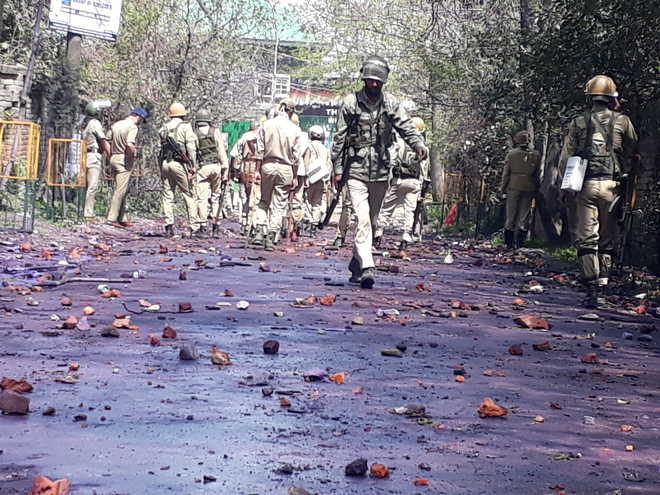
“If you throw stones, close schools, how will talks happen in Kashmir?" SC asks Kashmir Bar leaders. Tribune file photo
Satya Prakash
Tribune News Service
New Delhi, April 28
Amid increasing violence in Kashmir, the Narendra Modi Government on Friday told the Supreme Court that it would not hold talks with separatist leaders who wanted ‘azadi’ from India.
“We will talk to only those persons who are legally permitted to hold talks on behalf of people of Kashmir,” Attorney-General Mukul Rohatgi told a Bench headed by Chief Justice JS Khehar.
(Follow The Tribune on Facebook; and Twitter @thetribunechd)
Rohatgi said the government was willing to talk to only recognised political parties in the state.
The Attorney-General’s categorical statement came during hearing of a petition filed by the Jammu and Kashmir High Court Bar Association (Srinagar) challenging the high court’s verdict rejecting their demand to ban use of pellet guns against protestors in the Kashmir Valley.
“All those whom the law does not prevent, can meet and come out with suggestions, as the situation is not very palpable,” the Bench said.
The valley has descended into chaos due to violent protests that broke out after the killing of Hizbul Mujahedeen terrorist Burhan Wani on July 8, 2016. Petitioner alleged that 50 people had died and 300 partially or totally blinded, besides injuries caused to a large number of protesters by pellet guns used by security personnel.
According to the government, in 35 days between July 8 and August 11 last year, 3,777 policemen were injured and two of them died in mob violence. The number of attacks on the CRPF stood at 1,522 between July 8 and August 11, 2016.
The Bar Association wanted talks to be held with Hurriyat leaders without the condition that it must be within the framework of the Indian Constitution.
“If you throw stones, close schools, how will talks happen in Kashmir?" asked the Bench, which had on April 10 posed some serious questions to the Bar Association and asked it to suggest measures to deal with violent agitators, who often attack security forces and damage public and private property.
On Friday, it again requested the petitioner association to suggest a roadmap for dialogue and peace.
The top court asked the Bar Association leaders to get names of people who can hold talks with the Centre for resolution of present situation in the Valley.
“Dialogues have to be initiated by political leaders, not in courts,” Rohatgi told the Bench.
“Who is stopping them from having a dialogue? They can meet the Chief Minister or the Prime Minister,” the Attorney-General said.
The Bench said it would direct the Centre to hold talks only if there was a first step from the people whose cause the Bar Association espoused.
The court said it could ask the CRPF and the state police not to use pellet guns for two weeks, if it was assured that there would be no stone-throwing protests.
The Bench indicated that it could set the stage for talks between stakeholders from Kashmir and the Centre, but cautioned that nothing would work out if those representing the valley wanted secession.
“We can issue some directions if there is a reciprocal undertaking from your side,” the Bench told the Bar Association leaders.
“If we direct them (government) to stop using pellet guns, will you undertake not to throw stones and indulge in agitations?” the Bench asked the petitioner.
But the association leaders were apparently reluctant to give any undertaking, saying they don’t represent public at large.
The top court posted the matter for May 9 after asking the Bar Association to talk to people and get back to it with suggestions.
The Bench also made it clear to the Centre that it would involve itself in the matter only if there was a view that it could play a role and there was no jurisdictional issue.
“If you feel the court has no role and if you feel we have no jurisdiction, we will close the file at this moment,” the Bench told the Attorney-General who objected to some of the suggestions made by the bar body, including that the separatists were being ignored.
The Centre has been defending use of pellet guns as a penultimate measure before resorting to live bullets.
Rohhatgi had earlier told the Bench that the situation could not be allowed to go out of control in the border state where a neighbouring country was aiding and abetting people who hoisted ISIS and Pakistani flags and attacked security forces on a regular basis.



























